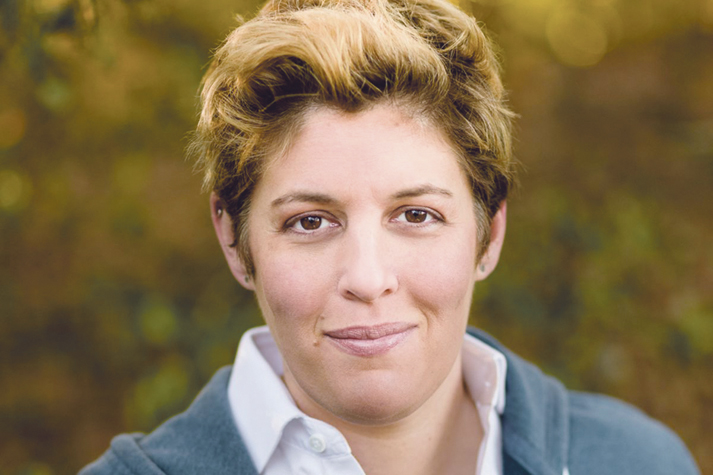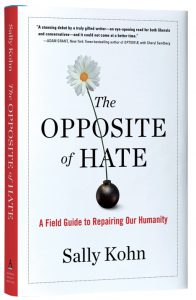CNN commentator talks about hate and hope

By Judy Bolton-Fasman, JewishBoston.com
In her new book, liberal writer and political commentator Sally Kohn explores what drives us to hate, and how we can exchange our biases for hope. She’ll discuss The Opposite of Hate: A Field Guide to Repairing Our Humanity on Nov. 5 as part of the JCC’s Cultural Arts & Book Fest.
Why did you write this book?
I always thought hate was someone else’s problem. When I went to work at Fox News as a liberal lefty, I thought they all hated me. But I realized when I went there, first, they were all quite nice people. They were not the horrible stereotypes I expected them to be. That was a shock to my system. I thought I’d hate them. That led me on this lifelong journey to try to understand why we hate, how we hate, and what we can do about it.
You introduce your book with an episode of childhood bullying in which you were the bully. What was it like to look back on that episode as an adult?
Every time I get asked that question, I feel a pang of remorse all over again. That might be your answer. It’s hard to confront anything we do that is imperfect. But it is also through confronting those incidents that we learn and grow and change. I can’t say that I want others to learn and grow and change if I’m unwilling to do so myself.
Why did you decide to confront some of your trolls personally? Why were these people worse on Twitter than in person?
One of the things I talk about in the book is the scholarship of why people act out online. It is harder to do that face to face. But social media also allows for sharing some incredible stories about people doing unbelievably kind things for others that are deeply transformative.
One of the ways in which I confront hate and deal with it on a daily basis is on my Twitter feed. Some people lead me to ask, how can people do this? I wanted to understand who these people are. Why do they hate me? They don’t think they’re hateful. They think I’m the hateful one. None of us, by and large, think we’re the problem. It’s a philosophy of hate that is extremely common.
 You write about a young Palestinian named Bassam Aramin, who co-founded Combatants for Peace with former Israeli soldiers. What opened Aramin’s eyes to stop hating in his own life?
You write about a young Palestinian named Bassam Aramin, who co-founded Combatants for Peace with former Israeli soldiers. What opened Aramin’s eyes to stop hating in his own life?
Bassam is one of the stories I tell in my book, which gives me hope that none of us have to be hateful because of the things we’ve done or said in our lives. We all have the capacity for change. When Bassam was a teenager, he was, by his own account and Israel’s account, a terrorist. He was convicted of terrorism for an attack for which he wasn’t physically present and no one was harmed — he went to prison.
Bassam acknowledges that he wanted to hurt and kill Israelis and Jews. In his mind and life, the two were conflated. The only Jews he knew were Israeli soldiers. In prison he saw a film about the Holocaust, which completely changed him. After prison, he got a master’s degree in Holocaust studies and founded this organization in which Israelis and Palestinians work together for common humanity and common understanding to find peace.
Arno Michaelis, a former neo-Nazi, turned away from white supremacy. What does that say about how we come to hate and how we give up hating?
I was quite desperate to find evidence about how Arno became Arno. He grew up in the United States, where white racial supremacy exists in our institutions, culture, habits and psyche. The most extreme versions of that kind of hate are dormant in all of us.
There is research in area after area that shows that a lot of the people who join hate organizations, terrorist groups or extreme anti-abortion groups don’t actually start out with those extremist, explicit, hateful views. People in those situations do what researchers call “sliding into hate.” On the one hand, it is tremendously unfathomable to hate that deeply. Yet on the other hand, it allows people to change.
The JCC’s Cultural Arts & Book Fest presents Sally Kohn interviewed by WYSO and Dayton Daily News’ Vick Mickunas at 7 p.m. on Monday, Nov. 5 at the Boonshoft CJCE, 525 Versailles Dr., Centerville. Tickets are $5 in advance, $8 at the door and are available at jewishdayton.org, by calling 610-1555, or the evening of the event.
To read the complete November 2018 Dayton Jewish Observer, click here.

